
Does oatmeal help you lose weight? The short answer is yes, it can, but there's more to the story.
Sugary toppings or improper portion sizes can quickly sidetrack goals, increase calorie counts, and alter oatmeal’s nutrient profile. The best oatmeal for weight loss is the one that tastes good and meets your nutrient needs during your weight loss journey.
Read on to discover oatmeal's virtues and vices, along with tips to prepare the best oats for weight loss.
Is Oatmeal Good for Weight Loss?
As its name implies, oatmeal is made from oats, a type of ancient grain that’s remained mostly unchanged for the last few centuries. They’ve been appreciated as a nutritional staple for many years and the subject of many modern scientific studies.
So, what else does the research reveal about oatmeal and weight loss? Oatmeal contains a mix of nutrients that make it a natural "superfood."
Diet experts emphasize oats as a heart-healthy whole grain that can replace refined carbohydrates (carbs). Incorporating oatmeal into your meal plan can assist you in making at least half your grains whole, ultimately contributing to your weight loss efforts.
Interestingly, oatmeal may be a regular occurrence in the diets of people looking to lose weight or maintain a healthy weight. According to a recent study, individuals in a body mass index (BMI) category of underweight, normal weight, or overweight consume significantly more oatmeal than those categorized as obese.
5 Benefits of Oatmeal
Can eating oats help you lose weight? Turns out, oats may be beneficial for general health, too! Here are the top reasons to add oatmeal to your meal rotation.
Adds Fiber to the Diet
Oatmeal contains many vitamins and minerals, but the nutrient that stands out is its high fiber content. Fiber is a type of complex carbohydrate which moves through the body more slowly during digestion. Technically, fiber is not digestible but adds value to the diet because it can keep blood sugar more stable and bowel movements more regular. It can also help you feel full, which can be crucial to regulating appetite and controlling cravings.
The 2020–2025 Dietary Guidelines for Americans asserts that fiber is a nutrient of concern many Americans aren’t getting enough of. Since oatmeal contains 4 grams of fiber per cup, you’ll progress significantly toward your daily recommended fiber intake. Recommendations for adults generally range between 19–38 grams per day, depending on your gender and age.
Looking for ways to increase fiber further? Boost the benefits of overnight oats by adding at least a tablespoon of chia seeds (another 4 to 5 grams of fiber)!
Helps Regulate Blood Sugars
In addition to containing fiber, whole-grain oats fall in the complex carbohydrates family. This means unsweetened oatmeal is less likely to result in a blood sugar spike, but you'll still want to keep an eye on portion size. Although it’s higher in carbs, oatmeal contains quality carbs (like fiber) and protein that can balance blood sugar more effectively than enriched grains (like a slice of white bread).
Additionally, recent research shows that eating whole grains daily can reduce heart disease risk. Also, adults eating at least three servings of whole grains may see an improvement in waist size and blood pressure. Benefits go beyond skin-deep to include improvements to markers of heart health.
Boosts Protein at Breakfast
Like fiber, protein is a nutrient that fosters a feeling of fullness. Oatmeal contains about 6 grams of protein per cup, making it a great breakfast meal. Eating oatmeal in the morning may keep you satisfied until lunch and may assist you in avoiding a mid-morning “crash.”
During your weight loss journey, foods like oatmeal that are higher in protein can help build or preserve muscle mass as you lose fat mass. Add more protein (and flavor) to your oatmeal bowl by drizzling a tablespoon of peanut butter. Combined with the protein and fiber in the oatmeal, the protein and healthy fats in nut butter will keep you feeling full for hours.
May Be Beneficial for Gut Health
Far from boring, fermented oatmeal is rising in popularity. Scientists are still working to pinpoint its benefits and whether it’s superior to plain oatmeal. Like other fermented foods, fermented oat porridges are believed to contain probiotics (“good” bacteria) that may benefit gut health. Not only is intestinal wellness beneficial for overall health, but it’s also tied to maintaining a healthy weight.
If you don’t opt for fermented products, you’re still in luck! Some of the dietary fiber in oatmeal may be broken down and fermented by the good bacteria in your gut.
Can Be Customized
As if oatmeal didn’t have enough benefits, it can also be customized according to tastes and preferences. Although traditionally prepared sweet, such as with maple flavoring or cinnamon, oatmeal can also be made savory. This can be an exciting departure from the norm if you’re getting bored with your usual oatmeal flavors.
Oatmeal Disadvantages
Just like any food, oatmeal isn’t a perfect fit for everyone. Especially if you’re opting for instant oatmeal, sneaky sugars or allergens may lurk. Here are a few reasons to be wary of oatmeal on your weight loss journey.
Not A Balanced Meal By Itself
Unfortunately, oatmeal isn’t totally balanced on its own, which can be a major drawback for some people. To help balance the carbs, you’ll want to add protein-rich toppings or healthy fats to the dish or prepare a side like sausage or eggs.
For specific individuals, this takes the “quick” out of the oats and makes it a more labor-intensive meal to prepare.
Added Sugar In Packets
While pre-made options can be tempting, store-bought oatmeal packets often contain added sugars. These instant oats may be ready momentarily but can spike your blood sugar almost instantly. It’s always a good idea to check the nutrition label before you buy and to avoid products with high amounts of added sugars.
Easy to Overload Toppings
Even if you make your oatmeal at home, it’s all too easy to add sugary toppings in! Brown sugar and raisins are two typical add-ins that can quickly increase the sugar in your bowl, especially if you aren’t paying attention to portion sizes. Luckily, as mentioned above, savory oats are also an option, and they may keep carbs and calories to a more manageable level.
May Not Be Allergen-Friendly
While oats are naturally gluten-free, they often come into contact with wheat or other grains containing gluten during processing. Some companies also add wheat to their oatmeal during processing, too. In any case, if you have celiac disease or gluten sensitivities, it’s important to look closely at the label for oatmeal made with certified gluten-free oats.
Best Oatmeal for Weight Loss
Interested in trying oatmeal for weight loss? Follow these top tips for serving up a steaming hot bowl that’s both nutritious and delicious.
Find the Best Fit for You
Before buying oatmeal or oats for homemade oatmeal, it can be beneficial to research the different types of oats. Common kinds include:
• Instant oats
• Quick oats
• Rolled oats (also called old-fashioned oats)
• Steel-cut oats (also called Irish oats)
At first glance, these oats look similar. However, subtle differences in how they are processed can change the nutritional value of the final product. For example, steel-cut oats may have a lower glycemic index (GI) because they take longer to digest, while the more thinly sliced instant oats tend to have higher GI values and are more likely to have added sugar.
Pay Attention to Portion Size
While oatmeal can be a nutritious choice, as with any food, you’ll want to practice moderation— there is such a thing as too much of a good thing! If you’re eating oats for weight loss or weight management, remember that 1 cup of oatmeal is about 150 calories. So, incorporate it as a meal or snack accordingly.
Don’t Limit Oats to Breakfast
Regarding oatmeal as a snack, remember that you don’t have to limit oatmeal to the morning meal. Instead, enjoy it any time of day! Oatmeal can make a great mid-morning pick-me-up, and savory oatmeal porridge can make a hearty, warming dinner (especially in the winter). Get creative with toppings to help it suit whatever time you’re serving it.
Buy in Bulk & Make Your Own “Instant Packs”
If you consume oatmeal regularly, don’t forget you can buy oats in bulk. While instant oats are convenient, buying bulk is often the most cost-effective method. There are even some options available online.
Attached to the idea of instant packets? Try making your own “instant packs” at home! Simply buy bulk oats, measure ½–1 cup of oats into a plastic bag, and add dry ingredients as desired (such as freeze-dried fruit or a tsp of cinnamon). Write cooking instructions on the outside of the bag with a permanent marker, or use a label maker so you know exactly how long to cook your creation.
Have Healthy Toppings on Hand
Having healthy toppings, mix-ins, and add-ins on hand can help make a healthy decision easier. For inspiration, start stocking your fridge or pantry with these tasty ingredients:
• Cinnamon
• Nut butter
• Protein powder
• Vanilla extract
Try Overnight Oats
For a quick and healthy meal (or snack), try making overnight oats the night before a busy day. They sound too good to be accurate, but you only need to mix the ingredients and let them sit in the fridge overnight.
Many recipes suggest adding Greek yogurt to boost protein or a tablespoon of chia seeds to boost fiber. Although they can be enjoyed heatedly, eating the overnight chilled oats with unique mix-ins can add a bit of novelty to your typical oatmeal breakfast.
Opt for Meal Delivery
Short on time but still in need of a balanced option? BistroMD to the rescue!

The apple cinnamon oatmeal comes complete with scrambled eggs and turkey sausage to ensure you have enough protein to balance out those complex carbs.
The apple cinnamon oatmeal is also made with thick rolled oats, meaning it will make for a more stable blood sugar. Plus, it’s naturally sweetened with a hint of maple syrup, fruit, and a touch of warming spices (including cinnamon, cardamom, and nutmeg). What’s not to love?
Oatmeal for Weight Loss: Final Thoughts
Oatmeal can be a nutritious and weight-loss-friendly dish, especially if you opt for thicker oats—like steel-cut or rolled oats—and low-sugar toppings. As with any food, you’ll want to keep serving size in mind and aim to add a few high-protein sides to your spread to create a balanced meal.
Although oatmeal can be a great fit for some, remember that “instant” options likely have added sugar, which may cause blood sugar spikes. Oatmeal may be cross-contaminated with allergens during processing. It’s always a good idea to look at the label before buying to ensure a certain oat or oatmeal brand aligns with your overall health and weight loss goals.
Oatmeal for Weight Loss: Related Questions
Does oatmeal help you lose weight?
Oatmeal contains fiber, protein, and other nutrients conducive to weight loss. Focus on proper portions and healthy toppings to encourage healthy weight loss.
Are overnight oats good for weight loss?
Overnight oats can be good for weight loss, especially when fiber-rich ingredients like chia seeds are added. Boosting protein with Greek yogurt can also contribute to weight loss efforts, and may help to stabilize blood sugar.
Can I eat oatmeal every day to lose weight?
Eating oatmeal daily may lead to weight loss, but it’s important to practice moderation. To ensure variety, diet experts typically recommend eating oatmeal no more than every other day. Switching up healthy toppings is also beneficial so that your body can receive a range of nutrients.






